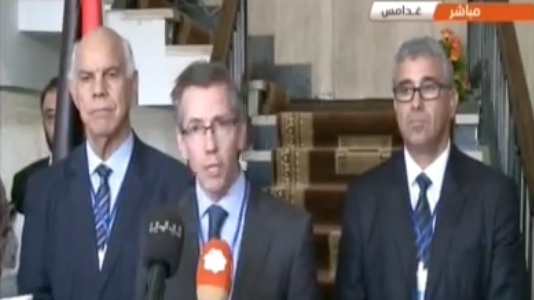By Libya Herald staff.

Tripoli/Benghazi, 29 September 2014:
Delegates to the Libya peace conference in Ghadames organised by the United Nations Support Mission . . .[restrict]in Libya (UNSMIL) have agreed on a total ceasefire between all warring factions throughout the country.
The 27 members of House of Representatives – 15 from those who have been taking part in its sessions in Torbuk and 12 from among those who have been boycotting it and remaining in Tripoli – welcomed political dialogue and specifically agreed that the country’s airports should be reopened, and that humanitarian needs had to be urgently addressed, particularly those related to the wounded on all sides.
The latter two decisions are designed to be a confidence building measures and are to be implemented with UN help.
Rejecting the use of force and agreeing that political dialogue was the only way forward to deal with the current crisis, the delegates also agreed to convene a second round of talks after Eid Al-Adha. At that point, they said, they would address all outstanding differences between them.
The positive mood at the meeting was noted by Special Representative of the UN Secretary-General, Bernardino Leon, who congratulated the representatives for their decisions.
“There was a good agreement today among all members meeting today. They all agreed that this is a great day for Libya. I think all of them are right … It was a meeting among brothers, all sitting together in a brotherly atmosphere,” he told a press conference afterwards. The decisions would allow Libyans to celebrate Eid with hope and happiness, he said.
The delegations from both sides were earlier welcomed at Ghadames airport by the town’s mayor, Yacoub Dawi, together with members of the Municipal Council and the Shoura Council. The Muncipal Council hosted the closed session meeting at its offices.
The Tobruk delegation consisted of First Deputy President Imhemed Shoaib (Zawia) as well as Abubakr Baira (Benghazi), Abdulwahab Zuliya (Kikla), Mohamed Al-Rahibi, Saad Al-Marimi (Abu Sleem), Salam Sargiwa , Nasreddin Mahni Aisa Al-Araibi (Benghazi), Mohamed Adam, Salhin Saad (Tobruk), Mehdi Hussein, Fahmi Al-Tuwati (Mezda), Asmaa Al-Khojah (Azziziya), Rahma Abubakr (Murzuk) and Abdulnabi Abdul-Mawli (Zawia). Its sixteenth delegate was former Foreign Minister Mohamed Abdulaziz who was a special envoy from the House of Representatives to the Ghadames talks.
Delegates from Tripoli included Mohamed Raeid (Misrata), Suleiman Al-Fagieh (Misrata), Mohamed Arifa (Sebha), former Higher Education Minister Naim Ghariani (Gharian), Ali Sbai (Hay Andalus), Sara Aswaiyah (Janzour) and Rabia Al-Fagieh (Suq Al-Juma).
Also present were the Special Representatives for Libya from the UK, Jonathan Powell, and from Malta, Joe Mangion.
“We have agreed to start a political process to address all issues on the elements on the situation in Libya today,” Leon said at the press conference. It would be done “in a peaceful way with a very strong call for a complete ceasefire all over the country,” he explained.
Members of the House of Representatives were sending “a very clear message” that they wanted to solve the problems “of normal people in Libya – the people who are suffering, especially after weeks of confrontation,” he said.
“They equally agreed that humanitarian relief will be provided for all Libyans. They agreed that for every family that has injured people, people who are suffering after confrontation, both sides will facilitate in the transfers of money, transportation and whatever needs these families may have.”
Both sides had also agreed, he said, “to address the situation of the airports in the country. To try to open all of them so that Libyans will have the possibility to travel, to move and to relieve the situation of the families.”
The date and venue of the next session is still to be decided. [/restrict]







